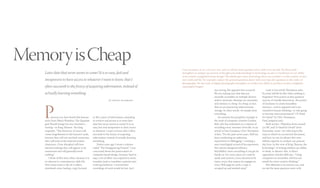
Plato's Phaedrus Story Warns of Forgetting Due to Technology
- 1. Perhaps you have heard this famous story from Plato’s Phaedrus: The Egyptian god Theuth brings his new invention— writing—to King Thamus. The king responds, “This discovery of yours will create forgetfulness in the learners’ souls, because they will not use their memories; they will trust to the external written characters. (Your disciples) will have learned nothing; they will appear to be omniscient and will generally know nothing.” I think of this story often, because it is so relevant to contemporary daily life. How many times a day do I collect, download, store, backup, copy, forward MemoryisCheap Later date that never seems to come? It is so easy, fast and inexpensive to have access to whatever I want to know, that I often succumb to the frenzy of acquiring information, instead of actually learning something. by Wendy Richmond This dilemma is an ancient one, and we ask the same question anew with every decade: Do these tools strengthen or weaken our powers of thought and understanding? Is technology an aid or a hindrance to our ability to be creative, insightful human beings? The debate gets more interesting when you consider it in the context of your own work and life. For example, replace the general questions above with more specific questions in the realm of photography: Do the tools of digital photography strengthen or weaken our ability to produce creative, insightful, meaningful images? or file a piece of information, intending to retrieve and peruse it at some later date that never seems to come? It is so easy, fast and inexpensive to have access to whatever I want to know, that I often succumb to the frenzy of acquiring information, instead of actually learning something. Twelve years ago I wrote a column called “The Disappearing Present.” I was concerned about the preservation of computer-based design, because, back in 1995, a lot of effort was required to store, translate (and re-translate) material onto evolving hardware. I worried that recordings of work would be lost, but I was wrong; the opposite has occurred. We are making sure that data are eternally accessible on multiple devices and/or networks. Backups are automatic and memory is cheap. So cheap, in fact, that we are practicing indiscriminate storage. In other words: we simply store everything. An extreme but prophetic example is the work of computer scientist Gordon Bell, who has embarked on a mission of recording every moment of his life. In an article in Fast Company, Clive Thompson writes: “For the past seven years, Bell has been conducting an audacious experiment in ‘lifelogging’—creating a near-total digital record of his experience. His custom-designed software, ‘MyLifeBits,’ saves everything it can get its hands on. For every piece of e-mail he sends and receives, every document he types, every chat session he engages in, every Web page he surfs, a copy is scooped up and stashed away.” Later in his article Thompson asks, “So what will life be like when nothing is forgotten? Provocative as that question may be, it’s hardly theoretical....the power of machines to create boundless memory—and to augment and even transform human thinking—is only going to become more pronounced.” (“A Head for Detail” by Clive Thompson, FastCompany.com) Both stories—Phaedrus from around 370 BC and “A Head for Detail” from November 2006—are referring to the ways in which we record and document, and how we use (or abuse) that near- infinite capacity to conduct our present- day lives. In the view of King Thamus, the “technology” of writing inhibits our ability to think, to discern. But, in direct opposition, Gordon Bell says, “Using computers to remember will free our minds for more creative thinking.” This dilemma is an ancient one, and we ask the same question anew with